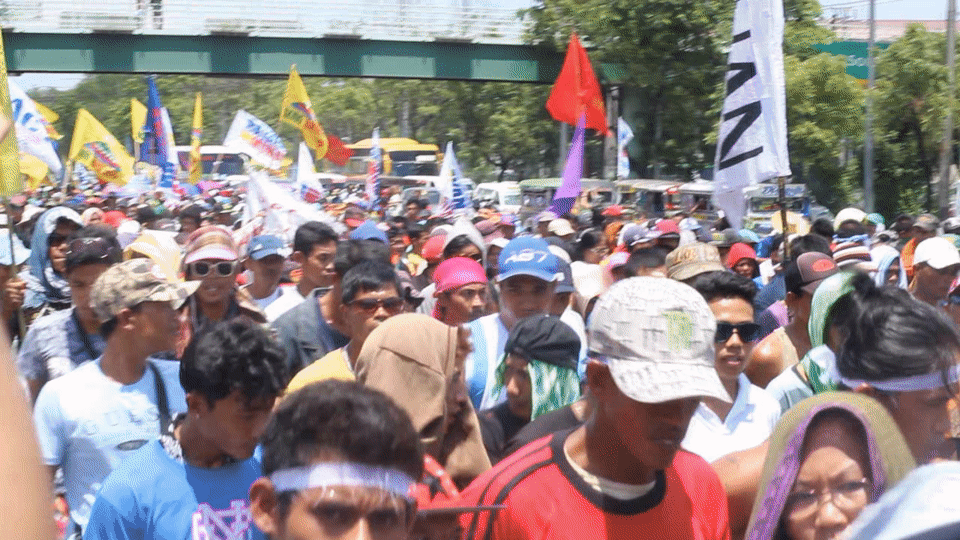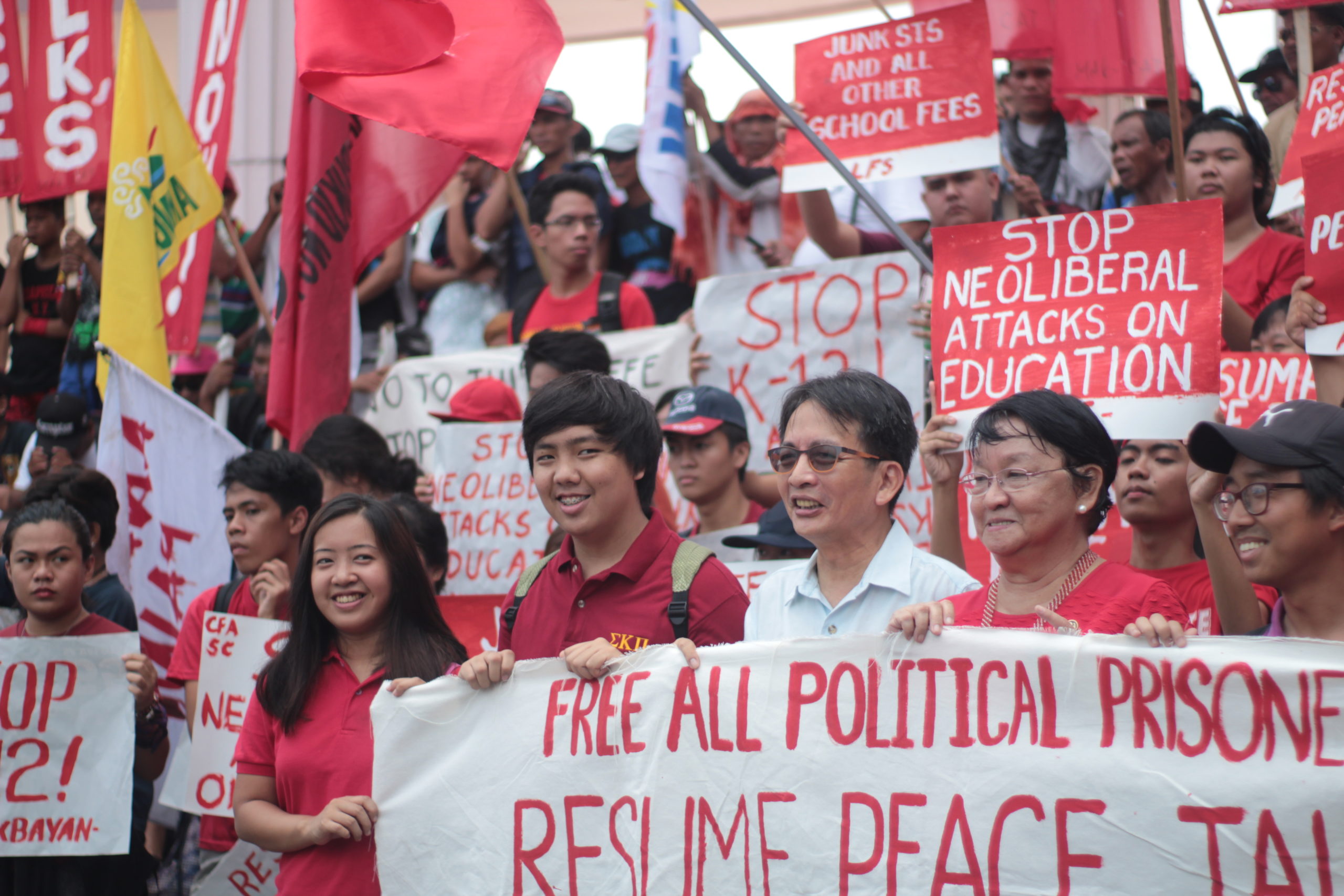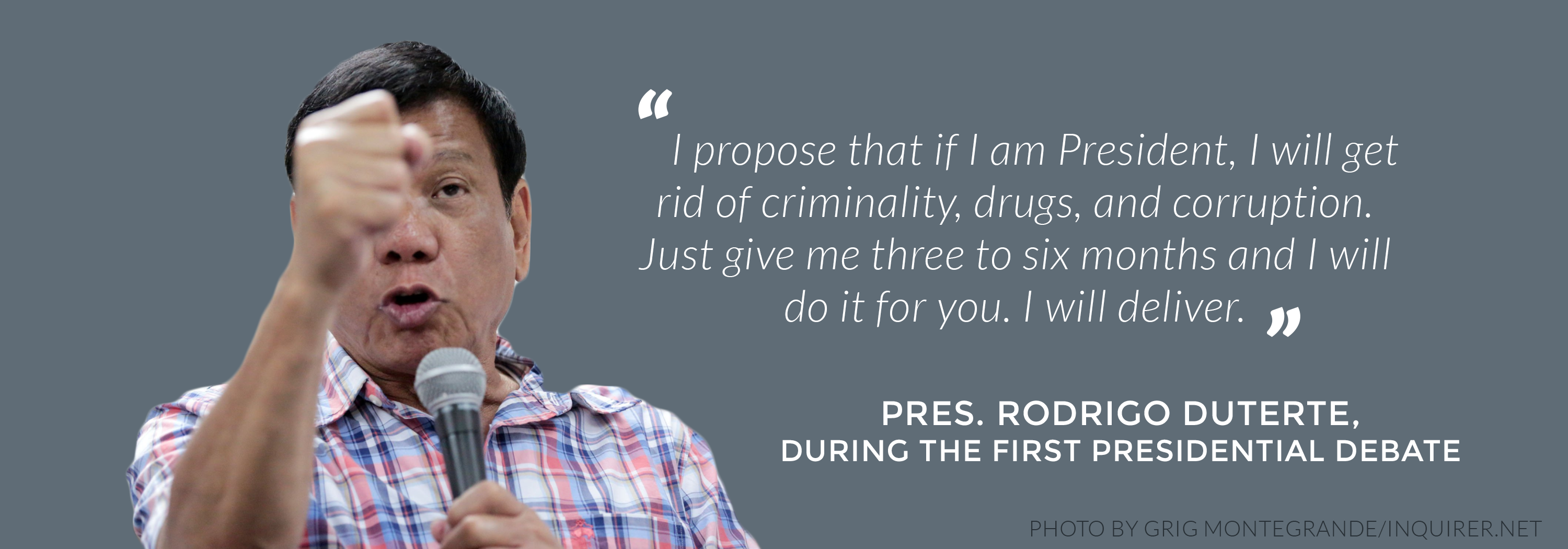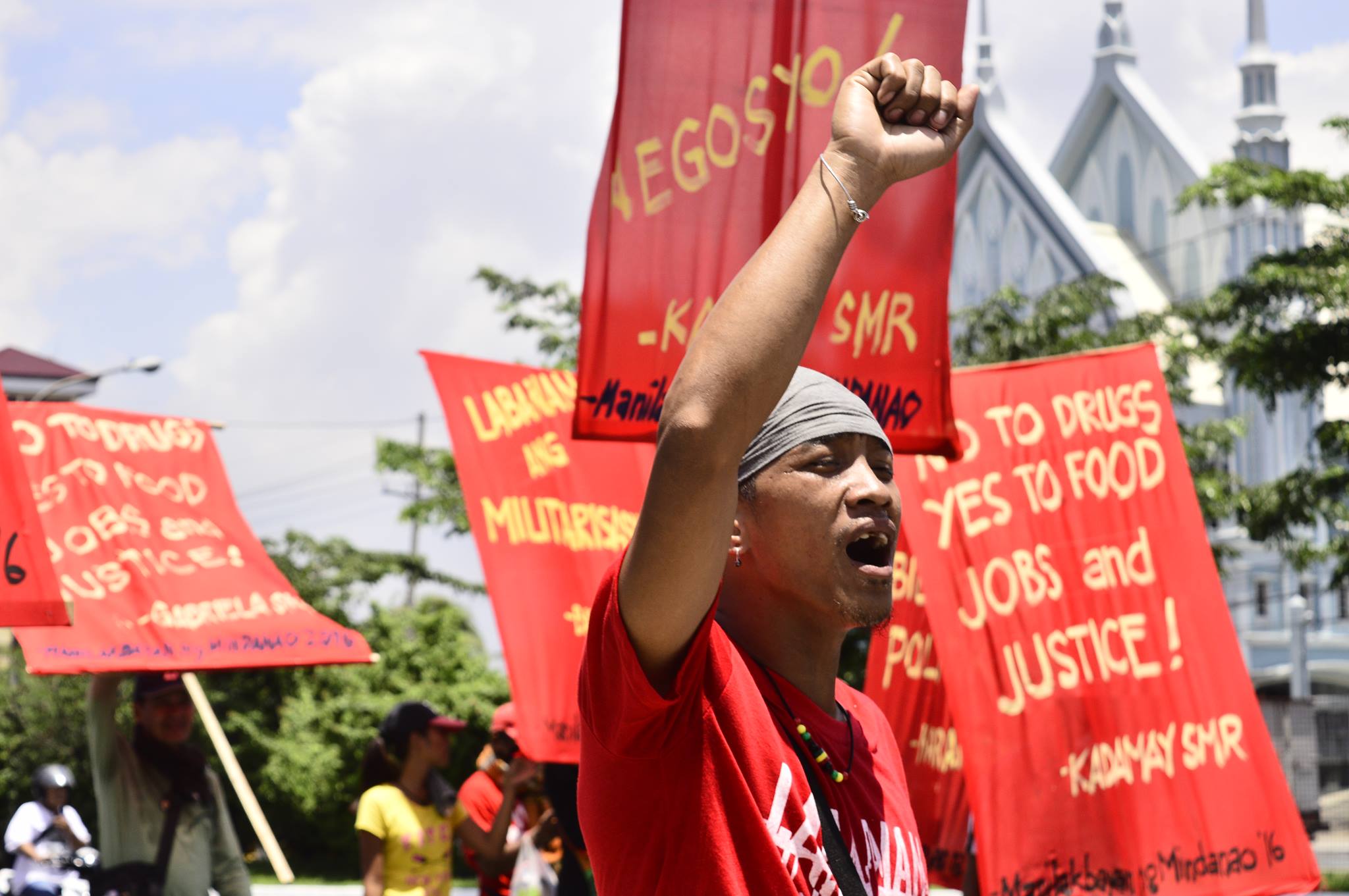BY BERNADEAN RABAJA AND MARIE UY
“Change is coming,” indeed, as for the first time, the people presented murals instead of a flaming effigy, and police officers relaxed at the sidelines despite the approaching protesters.
While trust surveys reveal that people generally think the mayor-turned-President has been off to a good start, people’s organization and progressive groups staged their own State of the Nation Address (SONA) in the streets to remind the new president that the people are still watching.
More than 40,000 rallyists from different parts of the country converged along Batasan Road to express their support for Duterte’s pro-people programs as he delivered his first SONA Monday at the Batasang Pambansa.
Thousands of Manilakbayan participants marched to the capital to join the largest SONA mobilization in recent history.

After a week-long journey, around 4,500 delegates from the Southern Philippines reached the capital, the biggest Mindanaoan contingent to ever participate in a SONA rally.
Meanwhile, the Bicol group numbered to more than 3,200 rallyists, while around 2,000 participants came from the Southern Tagalog provinces.
The Manilakbayan is an annual protest caravan hosted by people’s organizations, progressive groups and communities of farmers, workers and activists. In recent years, the caravan has brought thousands of delegates to the heart of Manila, with the aim of bringing the concerns of the countryside closer to the government.
A caravan for peace
“This is not a rally against President Duterte but [a] rally in support for his progressive and pro-people policies,” Manilakbayan spokesperson Bai Ali Indayla said in a press conference.
Alex Castidagas of Bagong Alyansang Makabayan (BAYAN) Sorsogon said he expected Duterte to speak on the resumption of peace talks between the government and major groups-in-conflict.
He also called for the release of all political prisoners and the release of coco levy funds to farmers.
“[Inaasahan namin] na maisagawa niya ang kanyang mga ipinangako sa taumbayan (We are hopeful that he will fulfill his promises),” Castidagas said.
“Sa panahon na ito, mas umiigting yung pagkakaisa ng taumbayan o sambayanang Pilipino (During these times, the unity of the Filipino people grows stronger),” Castidagas said.
BAYAN Sorsogon is an associate of the event’s main coordinator BAYAN Bicol. It was the first time non-Mindanaoans organized a Manilakbayan caravan of this scale.
“[Inaasahan namin] na maisagawa niya ang kanyang mga ipinangako sa taumbayan (We are hopeful that he will fulfill his promises),” Castidagas said.
In past years, SONA demonstrations have become synonymous with urban warfare, as violent skirmishes would ensue between protesters and the police along Commonwealth Avenue.
This year, participants of the caravan were quick to notice the absence of hostility between rallyists and police officers. Authorities would later dub the event as the most peaceful SONA rally in recent times.
Four years of struggle
The first caravan started in 2012 during the presidency of Benigno Simeon Aquino III. More than 70 peasant and Lumad delegates from Mindanao set off to Manila to expose the rising number of human rights violations in the Southern Philippines.
The delegates condemned the increasing number of extrajudicial killings in the countryside, as well as the seizure of indigenous people’s ancestral land, protection of large scale companies and agribusiness corporations and growing military presence in Lumad schools.
Apparently, cases of human rights violations worsened after Aquino introduced his counter-insurgency campaign Oplan Bayanihan, Kerlan Fanagel of Pasaka day Salugpungan Kalimudan (Pasaka) said.
Human rights watchdog Karapatan recorded a total of 114 extrajudicial killings from July 2010 to September 2012, most of which were documented from the Bicol and Southern Luzon regions and the provinces of Mindanao Region.
Another Manilakbayan was launched in 2014, with around 300 participants joining the caravan. Karapatan reported the forcible evacuation of 39 Lumad communities that year, which displaced around 4,700 men, women and children.
“This is the problem that ties all regions,” Manilakbayan 2014 spokesperson Jumorito Guaynon said. “No wonder that despite the heat and exhaustion, the participants continue to walk and express their rage against the government.”
The 2012 and 2014 caravans were both held in time for the annual commemoration of International Human Rights Day on December 10.
In 2015, the number of participants had grown to 700 Lumad delegates. The caravan hoped to shed light on the string of Lumad killings linked with intensified military operations in Mindanao that year.
It also called for the withdrawal of government troops from Lumad schools and communities and the disarmament of paramilitary forces allegedly hired by the military.
A university of the people
The University of the Philippines Diliman (UPD) is no stranger to hosting Manilakbayan delegates, having housed last year’s delegation in October 2015.
Participants of last year’s Manilakbayan stayed at the Kampuhan, a temporary settlement constructed on a vast open field near Ylanan Road and Commonwealth Avenue. Hundreds of visitors dropped by the Lumad camp to take part in educational discussions and cultural activities.

This year, the university housed the Bicol contingent, with 3,200 Bicolano delegates staying in Dagohoy, Village B., the College of Human Kinetics, College of Mass Communication, and College of Social Work and Community Development (CSWCD).
CSWCD student council chairperson Mark Macapinlac said the stay of 300 delegates, mostly farmers from the first district of Camarines Sur, had to be organized in just four days. College dean Prof. Jocelyn T. Caragay spearheaded the preparation.
“Dahil sanay naman na ang kolehiyo at pina-practice naman talaga din yung prinsipyo, welcome na welcome yung mga sektor ng magsasaka sa aming kolehiyo pag pupunta sila sa kalakhang Maynila (Because the college is used to these kinds of activities and given that we practice the principles involved, the farmers are very much welcome in our college whenever they visit Metro Manila),” Macapinlac added.
UPD University Student Council chairperson Bryle Leaño said the university initiative was organized by a multi-sectoral alliance composed of workers, contractual employees, teachers, and students working in coordination with UPD Chancellor Michael Tan and Vice Chancellor for Community Affairs Nestor Castro.
Meanwhile, participants from Mindanao took shelter in several locations around Metro Manila, including the Department of Agriculture and the Polytechnic University of the Philippines Sta. Mesa.
“Kailagang dumaan sa pakikipag-gitgitan, pakikipaglaban,” she said.
“Mas masarap pa rin sa pakiramdam yung nanalo dahil pinaglaban mo.”
In line with Duterte’s first SONA, the university community will support socio-economic reforms under the new administration, as well as the resumption of peace talks between the National Democratic Front (NDF) and Philippine government, he added.
Leaving for a cause
Gabriela Bicol secretary general Jen Nagrampa said participants found it hard to leave their daily lives for five days.
“Malaki na bagay yun sa mga magsasaka, yung hindi magsaka ng limang araw, hindi muna mag-hahanapbuhay (It’s a big thing for farmers to leave their livelihood for five days),” she said.
Nagrama said educating the farmers about their cause convinced them to join the caravan.
“Di rin namin sila makukumbinsi na sumama for five days kung hindi sila naniniwala na dapat tayong manawagan ng tunay na reporma sa lupa (We would not have convinced them to join the five-day caravan if they did not believe in the need to call for genuine agrarian reform),” she said.
The farmers were also drawn to the struggle for higher wages, social benefits, free education, healthcare, among others, Nagrama added.
A young farmer from Camarines Sur, who refused to be named, voluntarily joined the caravan in the hope of saving her farmlands.
She said there are plans to destroy their rice fields to make way for a new airport.
Plans of expanding the Naga airport in Pili, Camarines Sur had prompted the resistance of farmers whose sources of living will be displaced once the relocation of the airport runway cuts through the major irrigation canals in the area.
“Sana sa pagpunta namin e pakinggan [kami], na wag gawing paliparan yung palayan (I hope they will listen to us, that we do not want them to make an airport out of our rice fields).”
Nagrampa said the masses should not think that change comes from one person, but from the people themselves and their collective action.
“Kailagang dumaan sa pakikipag-gitgitan, pakikipaglaban (We need to go through the conflict, the struggle),” she said. “Mas masarap pa rin sa pakiramdam yung nanalo dahil pinaglaban mo (Nothing comes close to the feeling of having won something you have long fought for).”



